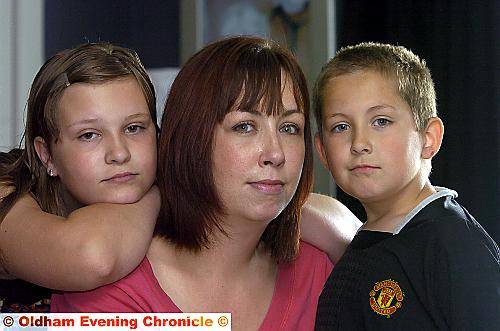Mum’s brave battle against drug giants
Date published: 30 July 2009

TAKING on the drug firms . . . Suzanne Wakeman and her children Bethany and Adam
IT is 36 years to the day since the legal action over the damage to babies caused by the drug Thalidomide ended with victims receiving £20 million compensation.
Consumer protection laws were changed after the scandal so patients had a way of claiming compensation even if negligence could not be proved.
Now, one Oldham woman is using the legislation to fight two pharmaceutical giants over different drugs she claims damaged her children. She spoke to RICHARD HOOTON.
Royton mum Suzanne Wakeman claims anti-convulsant drugs she took for epilepsy while pregnant resulted in her children Bethany (11) and Adam (8) developing serious disabilities.
As revealed in the Chronicle, The 31-year-old, of Newark Park Way, is part of a long-running group action against Sanofi-Aventis over the drug Epilim, and is also suing Novartis Pharmaceuticals over Tegretol, seeking damages of over £300,000.
Miss Wakeman started suffering from epilepsy at the age of 18 but took Epilim to ward off seizures.
When she fell pregnant with eldest daughter Bethany she was reassured by doctors there were no problems with continuing to take the medication.
But when Bethany was born it was clear something was wrong.
Miss Wakeman switched medication to Tegretol while expecting Adam but was oblivious to the possibility such medications could harm her babies.
It was only when she was seven months pregnant that she found a charity leaflet that listed the symptoms of Foetal Anti-Convulsant Syndrome that it’s clamed the drugs cause — and realised with horror that Bethany had them and Adam would also be affected.
Foetal Anti-Convulsant Syndrome can result in learning and social difficulties, ADHD, facial abnormalities, vision defects and delayed speech and motor development.
Bethany has struggled to develop social skills, has epilepsy and temper tantrums and is clumsy both socially and physically. Adam is dyslexic, dyspraxic, autistic and has hearing difficulties and foot problems.
Sanofi-Aventis stresses that it is not known why an increased incidence of congenital abnormalities has been demonstrated in children born to mothers with epilepsy.
It says there are a wide range of possible causes that are not specific to the medication. Doctors were also given warnings of possible effects in children born to mothers who take Eplilim during pregnancy.
But Miss Wakeman is convinced the medication is to blame and is horrified that she was kept in the dark.
She is now seizure free and has two more children, Matthew (6) and Luke (3), who are perfectly healthy.
She claims there are numerous reports dating back 50 years on the effects of anti-convulsants on children but accuses the drug companies of ignoring them and putting profit before children’s lives. People should have had the chance to make an informed decision, she argues.
Miss Wakeman said: “I feel my trust has been betrayed and it’s a shame. People have known stuff and still lied to me and have messed up my children — how dare they.
“It’s about informed choice that should not be taken away from people. There are alternatives. There’s new drugs coming through that are apparently better.”
The legal action is about principle not money, she says, though she wants to know her children will be financially secure and says they deserve compensation.
It’s estimated there are 37,500 children with the syndrome in the UK.
“Sanofi knew what was happening and they should pay for it, not income support,” she said. “They are the third biggest pharmaceutical in the world.”
The children have done remarkably well at school and socially despite their setbacks and Adam defied doctors to ride a bike and play football.
Miss Wakeman said: “Adam has issues controlling his temper. He works very hard at school. When he gets home he’s exhausted. He does so well against the odds.
“Bethany is doing very well. She’s permanently trying hard but it takes an effort for her to do things. She nearly died 13 times from seizures as a child.
“She should not have any of this. They knew what it would do. She should not be having to battle through her school life. They work harder than most children and are so brave.”
A single mum, Miss Wakeman has juggled caring for her children with holding down jobs and was also chairman of charity Organisation for Anti-Convulsant Syndrome (OACS), which is involved in the legal action.
She has dealt with the situation with courage and humour and says she feels lucky that her children don’t have worse problems.
Law firm Irwin Mitchell is bringing the claims under consumer protection laws (CPL) and is representing more than 200 parents. The Epilim case goes to trial in October.
Sanofi-Aventis says all anti-epileptic drugs have passed stringent medical tests.
A spokesman said: “Regardless of the treatment prescribed, women with epilepsy will generally deliver healthy children.
“Sanofi has over 30 years’ experience in providing treatments for the management of epilepsy and has always been committed to providing the best possible information to enable them to make informed choices concerning use of anti-epileptic medication.”
Novartis said it couldn’t comment due to the ongoing litigation.
Most Viewed News Stories
- 1You can score free tickets to a Latics game while supporting Dr Kershaw’s Hospice
- 2Primary school in Uppermill considers introducing new ‘faith-based’ entry criteria to tackle...
- 3Public inquiry announced into rail upgrade that could leave villages ‘cut off’ for months
- 4Tributes paid following death of hugely respected Oldham community figure Dale Harris
- 5Trio arrested, drugs and weapons seized following Chadderton raid




